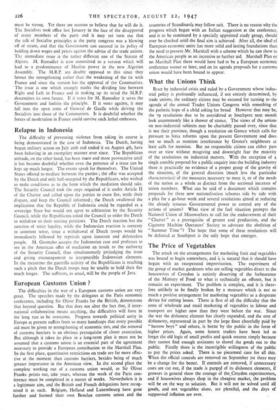What the Unions Think
Beset by industrial crisis and ruled by a Government whose indus- trial policy is profoundly influenced, if not entirely determined, by trade unions, the ordinary citizen may be excused for turning to the agenda of the annual Trades Unions Congress with something of the pathetic hope of a child asking for bread. However that may be, the 79 resolutions due to be considered at Southport next month look uncommonly like a shower of stones. The views of the unions on non-industrial subjects. may be charitably passed over, since that is not their province, though a resolution on Greece which calls for pressure to force reforms upon the present Government and does not so much as mention interference by Greece's neighbours at least calls for mention. But no responsible citizen can either pass over or view without misgiving and downright fear the majority of the resolutions on industrial matters. With the exception of a single sensible proposal for a public enquiry into the building industry there is practically no evidence of a proper grasp of the gravity of the situation, of the general direction (much less the particular characteristics) of the measures necessary to meet it, or of the needs of the nation as a whole as distinct from the sectional interests of union members. What can be said of a document which contains proposals for three new nationalisation schemes side by side with a plea for a 4o-hour week and several resolutions aimed at reducing the already tenuous Governmental power to control any of the actions of unions? What view of the fuel situation prompts the National Union of Mineworkers to call for the endorsement of their " Charter " as a prerequisite of greater coal production, and the Cigarette Machine Operators' Society to advocate the abolition of " Summer Time "? The hope that some of these resolutions will be defeated at Southport is the only hope that emerges.


































 Previous page
Previous page